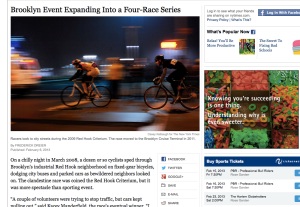
(Image via NY Times)
We start off our best-of-the-web recap today with several stories about car ownership and car culture…
— It seems to be getting more and more expensive to own a car. A few weeks back we shared that the annual cost of ownership had passed $10,000 (in Canada), now this week comes news that the price of gas accounts for the largest shared of household income in 30 years.
— And if that’s not enough, a study from the Texas A&M Transportation Institute found that America loses $121 billion in wasted time and fuel from sitting in traffic: That’s an average of $848 per capita (not to mention the dire environmental impacts).
— And to make matters worse, another new study has found that when you fill up at a local gas station, a whopping 66% of your cash goes to oil company coffers, “while very little of the remaining cash goes into the local economy.”
— A reporter for the Chicago Tribune outlines six reasons he foresees the end of America’s love affair with automobiles.
— Yet despite considerable (and negative) social, economic, and environmental impacts of our auto-centric society, the auto industry is hoping we buy even more cars. A global auto industry trade publication says that a full recovery from the automotive sector relies on, “consumers making multiple purchases.
— But it might be harder for Chicago Mayor Rahm Emanuel to retrofit his city with better bike access. Streetsblog Chicago broke the news that the State is putting up bureaucratic road blocks to his plan to build 100 miles of protected bike lanes.
“Is urbanism the new trickle-down economics?”
— Via Atlantic Cities, a Danish study shows kids who walk and bike to school “performed measurably better on tasks demanding concentration.”
— That study, and other stories about the connection between brain function and bicycling, have led Atlantic Cities reporter Sarah Goodyear to call for more research into the topic.
— The talk of how to pay for our roads continues to heat up. Here’s the latest from Politico on the potential of a vehicle-miles traveled tax.
— The relationship between police and people on bicycles continues to be one we, as a country, are still struggling to figure out. Here’s an interesting look at how bike advocates in California’s East Bay area are moving forward.
— As urban bicycling continues to take off, folks are finding that front racks/baskets are quite useful. Here’s an interesting “bent basket” design on Kickstarter.
— Gun buy-backs are in the news a lot these days. I’ve heard of authorities giving grocery store gift cards in exchange for guns; but in Uruguay, Treehugger reports that guns are being exchanged for bikes.
— Here’s some great news from the bike racing front: A fixed-gear race in New York City has picked up a major sponsor (Rockstar video games) and will expand into a four-race series.
— Aaron Renn of the Urbanophile blog made us put on our thinking caps with his latest piece: Is Urbanism the New Trickle-Down Economics?. Renn argues that progressives (the left) are the ones primarily pushing the bike, walk, and transit-friendly cities with dense housing and commercial zones; and that they are also pushing out those who can’t afford to live in such places.
— Another side of that argument might be Portland’s “Cartlandia” food pod. Situated just a few steps from the popular Springwater Corridor bike path, the development has proven successful in creating community in southeast Portland.
— We are all aware of the friendly competition between Portland and Minneapolis when it comes to biking; but how do the two cities’ transit networks compare?
— The can-bike-share-work-with-helmets debate has a new front: Seattle.
— Need advice on how to keep warm while biking in winter? This page is full of good tips.
— The latest from Bogota, Colombia — the city that inspired the open streets movement in America (including Portland’s Sunday Parkways) — is that their ciclovias have been institutionalized via a public referendum.
We recap the web’s best bike and transportation stories each Monday. Get in touch if you come across a link we should know about. To keep up with more great bike stories throughout the week, follow @bikeportland on Twitter.



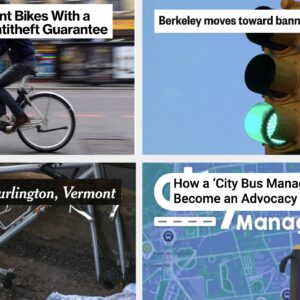
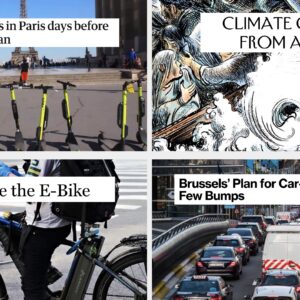
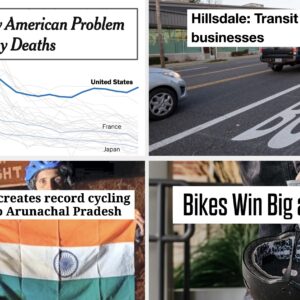
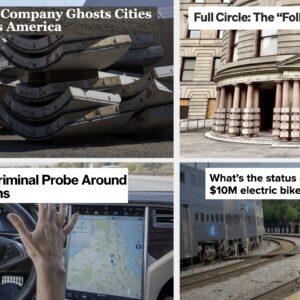
Thanks for reading.
BikePortland has served this community with independent community journalism since 2005. We rely on subscriptions from readers like you to survive. Your financial support is vital in keeping this valuable resource alive and well.
Please subscribe today to strengthen and expand our work.
In the negative column for owning a car- in the Northeast this week, you’ll spend a ton of time shoveling out your car, and then stress out about being able to park it again later.
Not to mention the child who died, and two people who went to the hospital for CO poisoning because of sitting in running cars with blocked tail-pipes to warm up while digging said cars out.
“The Energy Department’s statistical arm reported Monday that the average household spent $2,912 for gasoline in 2012, which makes up almost 4 percent of pre-tax income, tying 2008 for the highest percentage in roughly 30 years.”
Apparently they are using average household income as the denominator; if you use median household income it is over 6%.
Average household income is much higher than the typical income.
I suspect that median household income gives a better indication of the resources available to the typical family.
Some choose a 6000 lb 12 passenger vehicle with a 200 inch wheelbase for the commute/grocery run whereas others choose a vehicle more appropriately sized for an urban environment and the average loads they carry.
Until someone offers a realistic (and guaranteed) solution to the equity issue in charging these two people the same to use the roads. I think everyone should be against VMT schemes.
Sorry, I overestimated the seating capacity of my example vehicle. From Edmunds: the identically sized ESV offers three rows of seating and can accommodate up to eight people.
Wow, 12 people! Driving a big van or a small bus. My new 4 dr long bed truck only weighs ~4450# (with me in it).
I’d be willing to bet if they installed 12 seats into these 6000# vehicles, fewer people would buy them.
Not a van, only as big as one.
E350 Van L 237 W 79
Suburban/Escalade L 22
3 rows. 8 seats.
Unless the VMT fee includes a weight class multiplier. For example:
$0.10 per VMT
0-2000lb: 1.0 multiplier
2000-4000lb: 1.5 multiplier
4000-6000lb: 2.0 multiplier
Or some variation of that. This could be all inclusive, covering commercial and industrial uses as well. These multipliers could be adjusted to find a fair middle ground.
A weight class multiplier would work, but it’s exactly the sort of detail that would be easy to strike from any bill during negotiations.
Not to worry: there is not enough gasoline refinery capacity in the US to not include a weight component to the fuel tax.
Just think, if the trucking freight industry could instantly slide over to paying much lower automotive road use taxation levels just by changing fuels they would in a heartbeat. Fuel is the major cost, diesel is more expensive than gasoline and truck freight already pays a higher VMT+weight fee.
The diesel market would bottom out, gasoline prices would spike as the “legitimate business interests” ensure they get what they need while the rest of us get gas rationing.
Those “cost of congestion” studies seem to come out all of the time, and they are used to justify massive roadway expansion projects that just compound the problem (sprawl and car dependency). There will always be roadway congestion. If you widen the road, there will just be more space for the congestion. We need alternatives.
The fuel cost surprises me considering fleet estimated MPG is higher than ever and fuel costs have remained (relatively) level for the last 3 years.
http://gasbuddy.com/gb_retail_price_chart.aspx
And out of curiosity how much of our cash goes to Apple’s coffers when buying a Mac product?
You could always buy get a gas credit card (5% back) some stock and get back a nice piece of your spending in the way of dividends (3% back) and increasing stock value (6%+).
It’s almost too easy . . .
” though this time mostly advocated by those who would self-identify as being from the left”
describing today’s corporate-friendly progressives as “the left” is risible. imo, the trend towards new-urbanization red-lining has little to do with joe hill and a lot to do with narcissism and cold hard capital.
That Bent Basket Kickstarter strikes me as a “shut up and take my money” situation. I’d have one of those in a heartbeat.
Not to be too picky Jonathan, but Cartlandia is actually in SE Portland (being west of 82nd).